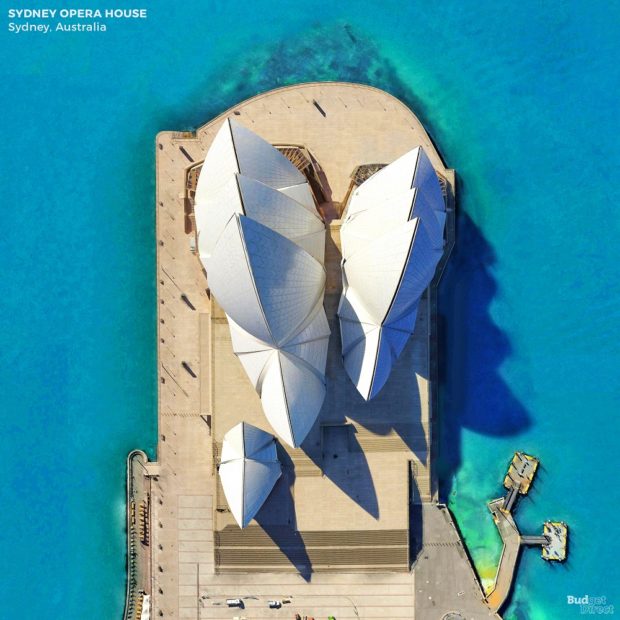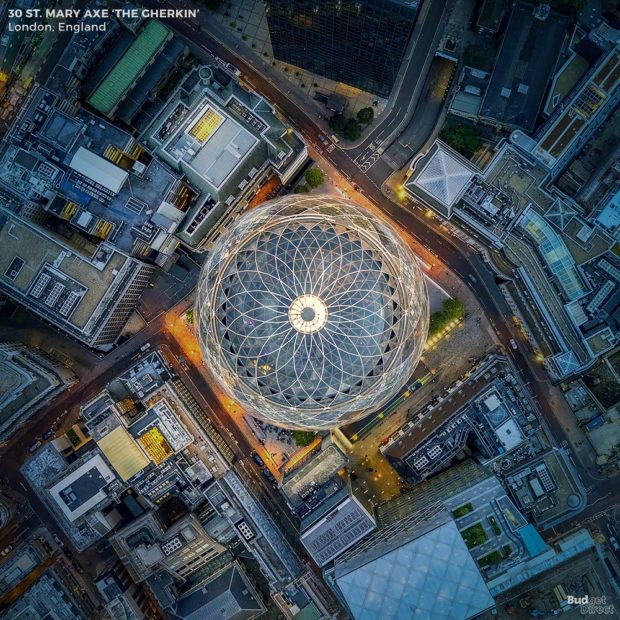You don’t even need to travel to have a clear image of some of the world’s most iconic landmarks. In many cases, these buildings are so familiar that many people could draw them from memory, without ever having seen them in real life.
For the lucky travellers who manage to tick these famous monuments off their travel bucket lists, however, there’s something pretty special about looking up at their grandeur and feeling a real sense of perspective. Rarer still is the chance of seeing these beautiful feats of engineering and design from above, unless you have access to a light aircraft or wings of your own, that is.
To save you the cost of a helicopter ride, Budget Direct have created six cinemagraphs (photos with a looping motion feature) so you can get a feel for what it would be like to witness these structures from a unique angle.
Sydney Opera House (Sydney, Australia)
Australia’s number one tourist destination is a feat of inspired engineering and design. Danish architect Jørn Utzon’s distinctive creation took 14 years to complete after winning an international competition in 1956, and has wowed sightseers and audiences ever since.

The structure fully occupies the harbor-side setting of Bennelong Point, which means it can be viewed easily from any angle. It’s a spectacular vision from land and water, and this cinemagraph shows that it’s just as beautiful from above.
‘The Gherkin’ (London, England)
Commonly known as ‘The Gherkin’ due to its unusual shape, 30 St. Mary Axe was built on the former site of the bomb-damaged Baltic Exchange, and opened in 2004. This commercial skyscraper is at the heart of the City of London financial district, and was designed by Norman Foster and Arup Group.

Residents as guests can enjoy panoramic views of London from a bar on the top floor of this 180m tall building, while others can see it from miles away from the ground. This rare aerial perspective shows the beautifully curved lines of the building’s dome.
The Eiffel Tower (Paris, France)
When Gustave Eiffel’s company designed and built this 324m-tall wrought-iron lattice tower for the 1889 World’s Fair, it wasn’t to everyone’s taste. Despite attracting criticism from artists and intellectuals at the time, it went on to become the world’s most-visited paid monument in the world.
It’s pretty impressive just to look up and see this geometric wonder from underneath, but there are also three levels for visitors that offer a great vantage of the Champs de Mars below. Eiffel’s secret top-floor pied-a-terre is now also available to see by tour. This view from above gives a fresh perspective on a very familiar and popular attraction.
The Statue of Liberty (New York, USA)
The colossal manifestation of the Roman god Libertas was designed by Frédéric Auguste Bartholdi and build by Gustave Eiffel, and presented in 1886 as a gift from the people of France in commemoration of the abolition of slavery and the Declaration of Independence.
The view of Lady Liberty from above gives a clear view of her 11-pointed star platform, which was actually a former fort built to protect New York Harbor. The Statue of Liberty delivers a more welcoming message to immigrants arriving by sea.
The Colosseum (Rome, Italy)
An aerial view of the Colosseum shows the lasting grandeur of Rome’s Imperial heritage. This oval amphitheatre was built around 70-80 AD during the Flavian dynasty, and was the stage for a variety of spectacles from gladiatorial contests and mock sea battles, to animal hunts, executions, and dramas based on classical mythology.
An aerial view shows the still-impressive remains of the Colosseum, which has been damaged by earthquakes and stone-robbers over the centuries.
Shwedagon Pagoda (Yangon, Myanmar)
Also known as the Golden Pagoda or the Great Dragon Pagoda, this magnificent structure is Myanmar’s most sacred Buddhist pagoda. Said to be more than 2,600 years old, it is possibly the oldest of its kind in the world.
The view from above gives a wonderful perspective of the geometric layers of the gold-plated stupas, and the ‘diamond bud’ at the very top, which is tipped with a 76-carat diamond. If you look closely, you can see people following the custom of circumnavigating the stupa in a clockwise direction.
